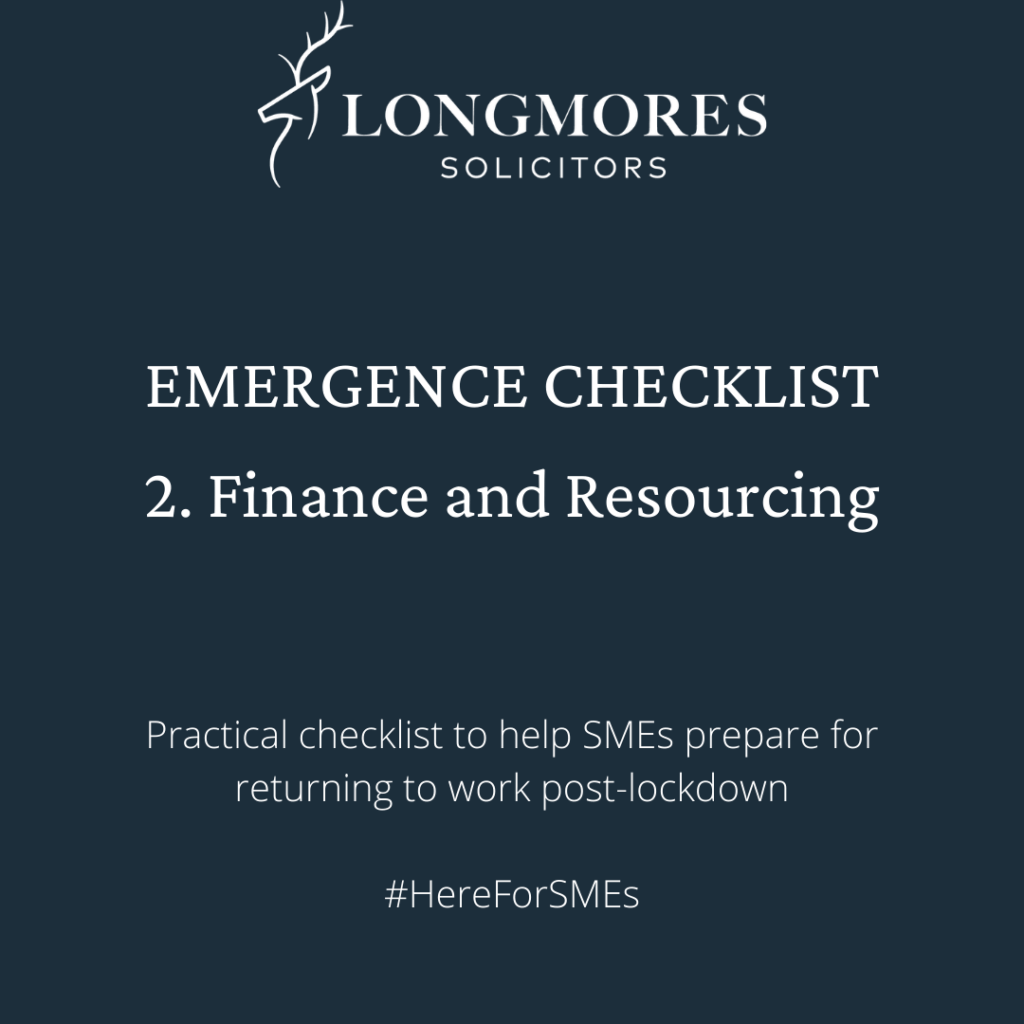Emergence Checklist – 2. Finance and Resourcing
Managing your cashflow will be vital if you are to exit the lockdown successfully. This means that you will need to understand your cash position both prior to exit and for the immediate future.
Cash will be important as we exit lockdown, so the focus from a finance perspective rightly centres on the cashflow of the business.
We have set out below a helpful checklist to help you prepare your business for the ‘post lockdown’ era. In the second of this series of four blogs, we focus on your finance and resourcing.
10-point Checklist
1. Update your short-term cashflow forecast
Monitoring cash receipts with a short-term cashflow forecast will help you to establish the cash requirements over the next few weeks. If you have spoken to customers to ask them about paying existing invoices and placing new orders, updating the forecast will ensure that you have a more accurate picture of the cash position.
2. Use forecasts as a decision-making tool
Understanding your cash position in the short- and medium-term will help you to assess what steps you will need to take in order to keep your business moving. Devising forecasts with different scenarios will help you understand what your options might be.
3. Start to look at the longer-term position
Starting to prepare a longer-term cashflow forecast will help you to understand what additional funding requirements you may need, and in what form. Consider the impact of any deferred payments that you have, including VAT and tax liabilities and make sure any payment holidays and their subsequent repayments are included in the projections.
4. Determine whether any additional cash is required
Many businesses are likely to need some additional help as they start back up again. Even businesses which have been going for many years will likely need to treat their business as a start-up for the next few months. Cash will be tight whilst the working capital cycle builds up again and there is likely to be some flex needed with payment terms.
5. Look at your options carefully if you need to access cash
Your existing bank or provider of finance should be the first point of contact if you need additional support. If they are unable to help then there are other sources of finance, both through CBILS accredited lenders and alternative providers in the ‘normal’ lending market. Seek advice if you are unsure – there are many lenders requesting personal guarantees so the concept of “buyer beware” is important here.
6. Consider the impact of any additional borrowing
Whilst additional funding may be required, caution should be exercised when opting to increase your debt obligations. When looking at borrowing money, whether that be with the deferral position mentioned above, or by possibly using the BBLS, you also need to understand how you will repay the loan. In the event of any reduction in turnover or cash collection, will your business be able to maintain the loan repayments without needing to refinance?
7. Cash collection will be key
Speaking with customers to obtain promised payment dates will help you to keep on top of cash collection. Having an effective credit control process in place will be key to making sure that debtors remain at a reasonable level. Being reasonable and showing empathy towards your customers who cannot pay the full amount is important, but your business also needs to be able to survive.
8. Remember that deferral is not debt forgiveness
Whilst there has been a lot of leeway with regards to payment obligations during the lockdown, any deferred payments will need to be repaid at some point. Keeping to agreed terms will be vital to maintaining creditor loyalty in case you need more flexibility later on, especially with existing supplier agreements.
9. Be prepared to make a loss
With the lockdown resulting in reduced turnover, this will undoubtedly have an impact on the profit margins. Many businesses will be looking at making a loss for a period. Use this period to review your fixed costs and identify any areas of the business which might have been historically underperforming and seek advice if necessary. Remember that you can only draw dividends if you have sufficient equitable reserves to do so.
10. Make sure that you utilise the tax reliefs available
There are various reliefs available for business owners which can assist in tax planning. Seeking advice to ensure that your business is benefiting from the appropriate reliefs will be time well spent.
Contact the Company Commercial team on 01992 300333 or email enquiries@longmores.law should you need any help with your business.
Request a full copy of the report including all four checklists.
Please note the contents of this blog are given for information only and must not be relied upon. Legal advice should always be sought in relation to specific circumstances.

